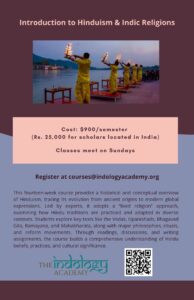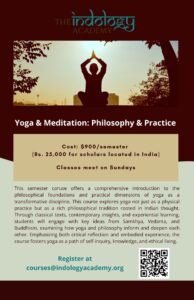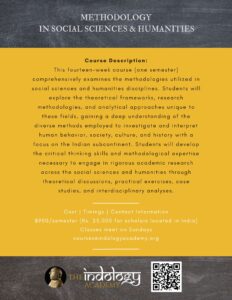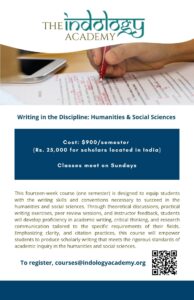Spring & Fall Courses
For course schedule and further information, contact courses @ indologyacademy.org

Introduction to Hinduism & Indic Religions
Course Cost: $900/semester (Rs. 25,000 for scholars located in India)
Course Description:
This fourteen-week course (one semester) offers a historical and conceptual exploration of Hinduism, from its ancient foundations to its modern expressions across the globe, including the United States. Taught by experts, the course emphasizes a “lived religion” approach, focusing on how Hindu traditions are experienced, interpreted, and adapted by practitioners in diverse cultural contexts. Students will engage with foundational texts such as the Vedas, Upanishads, Bhagavad Gita, and epics like the Ramayana and Mahabharata, while also examining philosophical schools, ritual practices, and contemporary reform movements. Through readings, discussions, writing assignments, and critical analysis, students will gain a holistic understanding of the beliefs, practices, and cultural significance of Hinduism.
Topics Covered:
-
Introduction to Hinduism: Defining Hinduism, its diversity, and the concept of “lived religion.”
-
Historical Foundations: Origins, the Indus Valley Civilization, the Vedic period, and key sacred texts.
-
Philosophical Schools: Overview of Hindu philosophical traditions such as Vedanta, Samkhya, and Yoga.
-
Key Concepts: Dharma, karma, samsara, moksha, and the paths of spiritual practice (karma, bhakti, jnana, raja yoga).
-
Mythology and Epics: Exploration of the Ramayana, Mahabharata, and Puranic traditions.
-
Rituals and Worship: Understanding puja, festivals, temple culture, and household practices.
-
Gods and Goddesses: Major deities such as Vishnu, Shiva, Devi, and their various forms.
-
Caste and Society: Historical and contemporary perspectives on varna, jati, and social organization.
-
Modern Reform Movements: 19th- and 20th-century thinkers and the impact of colonialism and modernity.
-
Hinduism in the Diaspora: The adaptation of Hindu practices in the United States and other global contexts.
-
Gender and Hinduism: Women’s roles, feminist interpretations, and gendered practices.
-
Yoga and Meditation: Spiritual disciplines and their contemporary global influence.
-
Hinduism and Other Religions: Interactions, syncretism, and dialogue with Buddhism, Islam, and Christianity.
-
Contemporary Issues: Hindu nationalism, identity politics, and global representations of Hinduism.
Learning Outcomes:
By the end of the course, students will be able to:
– Describe the historical development and diversity of Hindu traditions.
– Identify and interpret key Hindu texts, philosophical concepts, and practices.
– Analyze the role of rituals, festivals, and mythology in Hindu life.
– Understand how Hinduism has evolved in modern and diasporic contexts.
– Engage critically with scholarly interpretations of Hinduism.
– Write analytical essays demonstrating a nuanced understanding of Hindu traditions.
– Appreciate the relevance of Hindu thought and practice in contemporary global culture.
Prerequisites: None. This course is suitable for undergraduate and graduate students, as well as anyone with an interest in religion, culture, or history.
Time Commitment: Students are expected to dedicate three hours per week over fourteen weeks, including class time, readings, and assignments.
==============================================================================

Course Title: Yoga & Meditation: Philosophy & Practice
Course Cost: $900/semester (Rs. 25,000 for scholars located in India)
Course Description:
This fourteen-week course (one semester) offers a comprehensive introduction to the philosophical foundations and practical dimensions of yoga as a transformative discipline. Integrating classical texts with contemporary interpretations, the course explores yoga not merely as a physical practice but as a profound system of thought rooted in Indian philosophical traditions. Through weekly lectures, guided readings, reflective writing, discussion forums, and experiential practice, students will engage deeply with key philosophical ideas that underpin yogic traditions, including concepts from Samkhya, Vedanta, and Buddhism.
Students will gain insight into how philosophical inquiry enriches the practice of yoga, and how yoga, in turn, becomes a means of philosophical reflection. The course will emphasize both textual understanding and embodied learning, helping students cultivate a critical yet experiential engagement with yoga as a path of knowledge, self-inquiry, and ethical living.
Topics Covered:
-
Introduction to Yoga as Philosophy and Practice: Historical development and definitions of yoga and meditation across traditions.
-
Samkhya and the Yogic Worldview: Dualism, Purusha-Prakriti, and the metaphysical foundations of Patañjali’s Yoga.
-
Patañjali’s Yoga Sutras: Key concepts such as the Eight Limbs (Ashtanga Yoga), citta-vṛtti-nirodhaḥ, and samādhi.
-
Ethics and the Inner Life: Yamas and Niyamas as foundations for ethical self-cultivation and social responsibility.
-
Yoga and the Bhagavad Gita: Karma Yoga, Bhakti Yoga, and Jnana Yoga as modes of spiritual engagement.
-
Body, Breath, and Consciousness: Philosophical perspectives on āsana, prāṇāyāma, and meditation.
-
Yoga in Vedanta & Buddhism: Comparative explorations of meditation, non-duality, and liberation.
-
Contemporary Yogic Thought: Modern interpretations, the global reception of yoga, and critiques of cultural appropriation.
-
Yoga and Self-Knowledge: The role of self-awareness, detachment, and transformation in the yogic journey.
-
Experiencing Yoga & Meditative states: Reflective practice sessions integrating philosophical insights with meditative and somatic awareness.
Learning Outcomes:
By the end of the course, students will be able to:
-
Explain core philosophical concepts that inform classical and contemporary yoga traditions.
-
Interpret and analyze key texts such as the Yoga Sutras and the Bhagavad Gita in philosophical context.
-
Reflect critically on the ethical and metaphysical foundations of yoga.
-
Integrate theoretical insights with personal practice and embodied experience.
-
Situate yoga within broader Indian philosophical frameworks and global discourses.
-
Articulate the relevance of yoga philosophy to modern life and personal transformation.
Prerequisites: None. A willingness to engage with philosophical texts and a personal interest in contemplative practice are encouraged.
Students will need to dedicate three hours per week over the fourteen-week course, which includes live classes, independent study, and optional guided practice. This course is suitable for students of philosophy, religious studies, yoga practitioners seeking deeper insight, and anyone interested in the intersection of embodied practice and philosophical inquiry.
==============================================================================

Methodology in Social Sciences and Humanities
Course Cost: $900/semester (Rs. 25,000 for scholars located in India)
Course Description:
This fourteen-week course (one semester) comprehensively examines the methodologies utilized in social sciences and humanities disciplines. Students will explore the theoretical frameworks, research methodologies, and analytical approaches unique to these fields, gaining a deep understanding of the diverse methods employed to investigate and interpret human behavior, society, culture, and history with a focus on the Indian subcontinent. Students will develop the critical thinking skills and methodological expertise necessary to engage in rigorous academic research across the social sciences and humanities through theoretical discussions, practical exercises, case studies, and interdisciplinary analyses.
Topics:
1. Introduction to Research in Social Sciences and Humanities: Understanding the interdisciplinary nature of research, defining research questions, and identifying relevant methodologies.
2. Research Design and Methodological Approaches: Exploring various research designs, including experimental, observational, qualitative, quantitative, survey, archival, and comparative methods.
3. Data Collection Techniques: Survey methods, interviews, oral histories, ethnography, archival research, textual analysis, and digital humanities approaches.
4. Data Analysis in Social Sciences and Humanities: Quantitative analysis techniques include statistical and qualitative methods.
5. Mixed Methods Research: Integrating quantitative and qualitative approaches, identifying synergies, and addressing challenges in interdisciplinary research.
6. Ethics and Research Integrity: Ethical considerations in social science and humanities research, including informed consent, confidentiality, power dynamics, and cultural sensitivity.
7. Writing and Presenting Research: Academic writing conventions in social sciences and humanities, crafting research proposals, scholarly articles, and conference presentations.
8. Interdisciplinary Perspectives: Exploring intersections between social sciences and humanities disciplines, interdisciplinary research trends, and collaborative methodologies.
9. Critical Evaluation of Research: Assessing the validity, reliability, and impact of research studies in social sciences and humanities, identifying biases, and engaging in critical reflection.
10. Research in Practice: Undertaking a small-scale research project applying methodological principles learned throughout the course, from conceptualization to dissemination.
Learning Outcomes:
Upon completion of the course, students will be able to:
– Demonstrate a comprehensive understanding of the methodologies employed in social sciences and humanities research.
– Design and implement research projects drawing on appropriate methodological approaches from both fields.
– Collect, analyze, and interpret data using various qualitative and quantitative techniques.
– Navigate ethical considerations inherent in social sciences and humanities research and uphold standards of research integrity.
– Communicate research findings effectively through written reports, presentations, and other scholarly formats.
– Critically evaluate research studies from interdisciplinary perspectives, identifying strengths, limitations, and opportunities for further inquiry.
Prerequisites: None, although familiarity with social science and humanities concepts is beneficial.
Students will need to dedicate three hours per week for the fourteen-week duration; this includes class time and independent reading. This course suits undergraduate and graduate students across social science and humanities disciplines who seek to develop their methodological skills and engage in interdisciplinary research.
=====================================================================================

Writing in the Discipline: Humanities and Social Sciences
Course Cost: $900/semester (Rs. 25,000 for scholars located in India)
Course Description:
This fourteen-week course (one semester) is designed to equip students with the writing skills and conventions necessary to succeed in the humanities and social sciences. Through a combination of theoretical discussions, practical writing exercises, peer review sessions, and instructor feedback, students will develop proficiency in academic writing, critical thinking, and research communication tailored to the specific requirements of their fields. Emphasizing clarity, coherence, argumentation, and citation practices, this course will empower students to produce scholarly writing that meets the rigorous standards of academic inquiry in the humanities and social sciences.
Topics Covered:
1. Introduction to Academic Writing: Understanding the conventions and expectations of scholarly writing in the humanities and social sciences.
2. Writing Processes: Strategies for prewriting, drafting, revising, and editing academic papers.
3. Crafting Clear and Coherent Arguments: Developing thesis statements, constructing logical arguments, and organizing ideas effectively.
4. Incorporating Evidence: Integrating primary and secondary sources to support arguments, paraphrasing, summarizing, and citing academic sources correctly.
5. Critical Reading and Analysis: Engaging with scholarly texts critically, identifying key arguments, and evaluating evidence and methodologies.
6. Writing Across Genres: Academic essays, literature reviews, research papers, case studies, annotated bibliographies, and other scholarly genres.
7. Style and Voice: Developing a scholarly voice, enhancing clarity and coherence, and adapting writing style to different audiences and purposes.
8. Conventions of Citation and Referencing: Understanding citation styles (e.g., APA, MLA, Chicago), creating bibliographies, and avoiding plagiarism.
9. Peer Review and Revision: Providing constructive feedback to peers, revising drafts based on feedback, and improving writing through iterative processes.
10. Professionalization and Publication: Navigating the publication process, preparing manuscripts for submission to academic journals, and engaging with disciplinary communities.
Learning Outcomes:
By the end of the course, students will be able to:
– Demonstrate proficiency in academic writing conventions specific to the humanities and social sciences.
– Formulate clear and persuasive arguments supported by evidence from scholarly sources.
– Engage critically with academic texts and synthesize ideas from multiple sources.
– Use appropriate citation and referencing practices to acknowledge sources and avoid plagiarism.
– Revise and edit their writing effectively in response to feedback and peer review.
– Communicate research findings and insights to academic audiences in a scholarly manner.
– Understand the professional standards and practices associated with scholarly publication in their disciplines.
Prerequisites: None, although a basic familiarity with research methods and disciplinary concepts is recommended.
Students will need to dedicate three hours per week for the fourteen-week duration; this includes class time and independent reading.. This course is suitable for undergraduate and graduate students pursuing degrees in humanities and social sciences disciplines and researchers and professionals seeking to enhance their academic writing skills in these fields.
===================================================================

